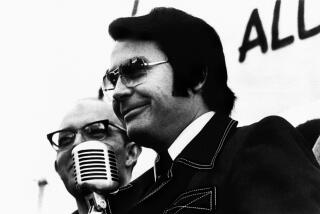NONFICTION : BHAGWAN: THE GOD THAT FAILED by Hugh Milne (St. Martin’s: $15.95; 320 pp.).
- Share via
Hugh Milne’s tale of 10 years with Bhagwan Shree Rajneesh, “Bhagwan: The God That Failed,” offers a detailed account of how the Indian guru operated and what it was like to be a loyal member of a sex cult. The bottom line is what you might expect: The guru was a tyrant but the dramatically varied sex life was sufficient compensation.
At least until the cult, which numbered about 3,000 at its height, shifted from an obscurely located ashram in India to a 64,000-acre Oregon ranch. There the operation disintegrated under a constant barrage of Oregonian hostility to outsiders and the even more relentless Oregon weather. At the time of purchase, it apparently never occurred to anyone to inquire why the ranch was called “The Big Muddy.” It’s amazing how a little thing like the annual rainfall count can ruin an otherwise ribald life style.
If Milne had a flair for comedy writing this could have been one hell of a funny book. Any guru who gets his start through the good offices of the A-1 Biscuit Company of Bombay, as Milne reports, and indulges a mania for collecting tens of thousands of felt tip pens, not to mention the well documented 90 Rolls Royces, is begging for satirization.
True believers, even disenchanted ones, are short on humor as a rule, so Milne spins the by now familiar story of how the mean, heartless master endangered his followers lives through back-breaking labor, seduced their wives or girlfriends, half-starved them to death and when things didn’t work out, said it was all their fault. The author makes little effort to link Rajneesh to other cult leaders of his ilk and hence fails to recognize the strikingly similar pattern most of them display. Although he deplores Bhagwan’s privations, Milne still thinks himself a better man for the experience, telling us “. . . I do not regret my years spent in the Rajneesh movement.” Those scarred by herpes, stricken with AIDs or simply blown away by the error of their folly might think differently.
More to Read
Sign up for our Book Club newsletter
Get the latest news, events and more from the Los Angeles Times Book Club, and help us get L.A. reading and talking.
You may occasionally receive promotional content from the Los Angeles Times.








